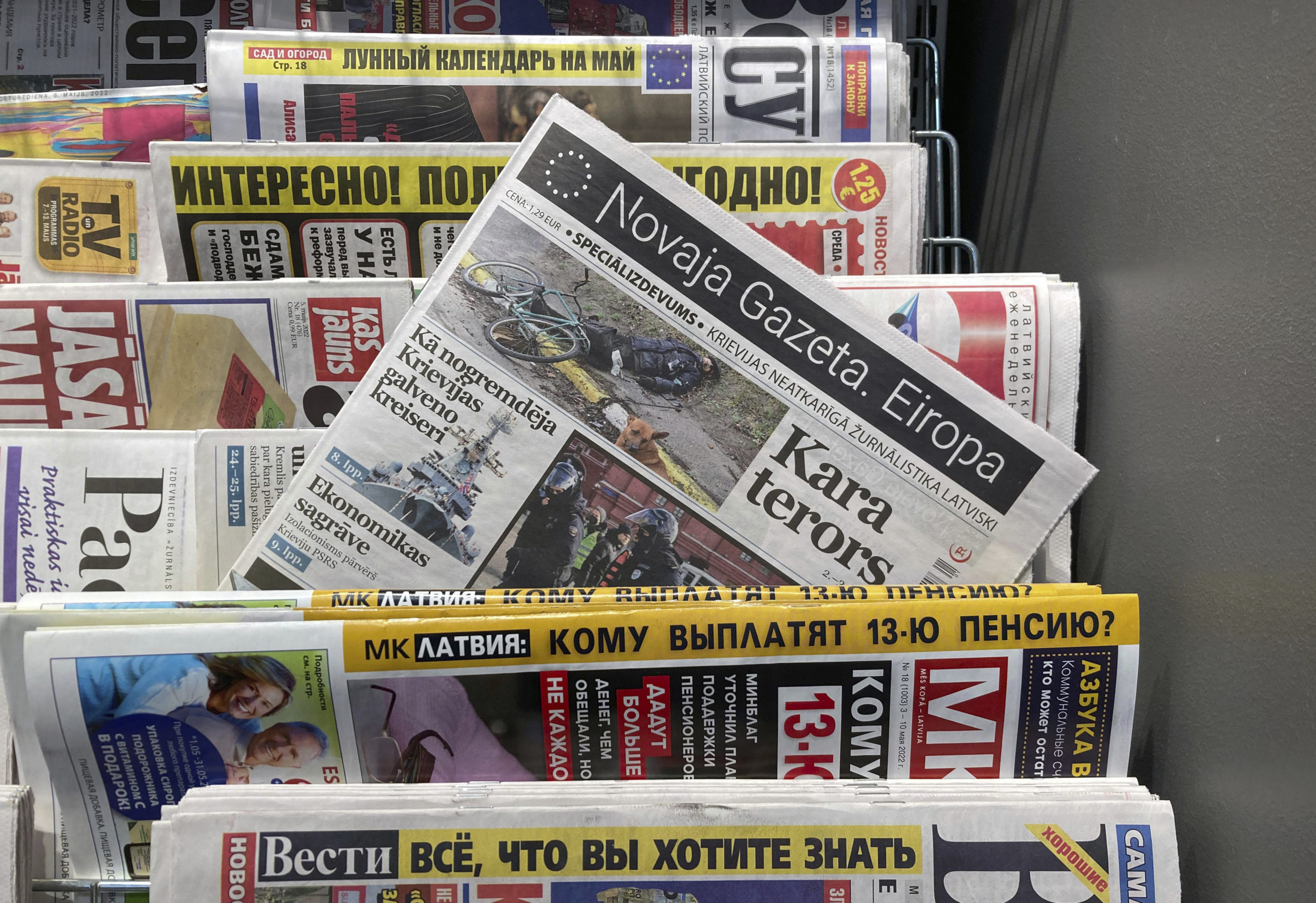
The Latvian edition of Novaya Gazeta Europe is stuck at a newsstand in Riga. A print edition of the European version of the well-known Kremlin-critical newspaper Novaya Gazeta appeared in Latvia for the first time as many Russian independent media outlets moved abroad
This war, like any war, has no shortage of heroes: not only the Ukrainian recruits fighting valiantly against a far larger Russian military, but also journalists, Ukrainian and foreign, covering the war at great personal risk. These correspondents deserve our gratitude and support, but there is another cadre of reporters embarking on a different sort of mission and facing different dangers: Russia’s independent media. These journalists desperately need our support, too.
President Vladimir Putin has squashed Russia’s last remaining independent news outlets, threatening journalists as well as ordinary citizens with imprisonment should they stray from the Kremlin line. (A new law passed at the beginning of the conflict carries punishments of up to 15 years in prison for anyone who spreads what the government deems “false information” about the invasion.) At least 150 Russian journalists have responded by fleeing to neighboring countries like Armenia, Georgia, and Latvia and forming a kind of media-in-exile. Working their sources by phone and other platforms, they continue to report on the war in Ukraine as well as the increasingly authoritarian darkness in Russia.
Consider the case of Roman’s news outlet, IStories (or “Important Stories”). Under increasing pressure from the Kremlin, he and his staff crammed their laptops, their pets, and their lives into vehicles and made the long journey to Latvia and other countries. They waited at the borders for hours, afraid they might be arrested. Once out of Russia, they discovered their credit cards didn’t work. No one wanted to rent apartments to them because of their nationality. These journalists occupy a kind of netherworld, not welcome in Russia yet eyed warily abroad because of where they come from. They have become stateless and homeless yet determined to fight the information war.
IStories’ audience is young, tech-savvy — and curious. Unlike their parents, they don’t consume a steady diet of state media’s twisted facts and outright lies. As the impact of sanctions deepens, they will have many questions. Why are Putin’s cronies growing richer while we are getting poorer? What exactly is the British government doing, or not doing, to crack down on Russian oligarchs living in London?
READ MORE: Putin Shuts Down Russia’s Free Press for Accurately Reporting on Ukraine
This young audience will look to Russian independent media for answers. They have already begun. For instance, IStories’ coverage of the atrocities and possible war crimes committed by Russian troops in the Ukrainian town of Bucha, were read widely and deeply. IStories is delivering its coverage to more newsletter subscribers than ever before — growth that is taking place not among expatriates but inside Russian borders — and has seen more than 50 percent growth on Telegram. They reach others on Instagram and YouTube, where IStories has 184,000 subscribers and recently published a 15-minute video compilation showing exactly what Putin wants no one to see: the death and destruction the war has brought to both Ukraine and his own soldiers. (“The tanks are pushing us forward as meat shields,” says one Russian fighter.) Getting information out of Russia proves harder, as many people fear the consequences of speaking to a journalist, but IStories continues to publish stories questioning Putin’s decision to go to war and documenting the atrocities the Russian military is inflicting on Ukraine.
Audiences are seeking out coverage from IStories and other independent sources. Meduza, an independent news outlet founded by a Russian journalist based in Latvia, has millions of readers and has roughly tripled the number of followers on its Telegram channel since the invasion, a spokeswoman said. While their site is blocked in Russia, visitors can still access it using VPNs, and their Instagram channel and newsletters remain accessible. They have lost sources inside the country in recent weeks, but others risk talking anonymously to Meduza’s reporters from afar. Funding is yet another challenge: Meduza quickly shifted from crowdsourcing funds from their Russian readers who are no longer able to use credit cards due to sanctions to international supporters. They also are offering more English-language content than ever.
Other media-in-exile are reaching new audiences as well — such as Proekt Media, Holod, MediaZona, ROMB and the newly rebranded Novaya Gazeta Europe. They are working hard to ensure that Russian youth aren’t poisoned like their parents by Kremlin propaganda. But like the Ukrainian military, they are outgunned and out-funded. Just as much of the world is stepping up to supply Ukraine with the resources it needs to win this war, we also need to supply these journalists with what they need. Not weapons, of course, but plenty else.
Russian journalists in exile need money. The cost of living abroad is higher than it is in Russia, and news outlets can no longer rely on readers inside the country to support their journalism financially. Funders can help by backing reporting fellowships and grants for newsrooms-in-exile. U.S. and European newsrooms can hire Russian journalists and outlets to collaborate on reporting, something that would deepen their own coverage. And people who want to help can subscribe or donate to independent news outlets. (The same is true for Ukrainian media as well.)
These reporters also need access to technology both to cover the news and to disseminate it to get past Putin’s firewalls. Censorship circumvention platform Psiphon is bringing reporting from independent news outlets to Russians who use Psiphon to access the internet — even if the users are only trying to get to a banned site such as Facebook. Psiphon needs funding to keep this important service going. Apple should make iCloud Private Relay, which hides users’ IP addresses from the sites they are visiting, available in the country again. And Facebook, now banned in Russia, should be more responsive to independent news outlets in Ukraine struggling to reach audiences and generate revenue because the platform is flagging their war coverage for violating community standards in a way that’s stifling important information from reaching larger audiences.
It would be wrong to think of this as only, or even primarily, a problem of technology. The best platforms and circumvention techniques in the world are useless without quality, independent journalism. And that means helping with low-tech solutions such as visas to safe havens in the U.S. and Europe where journalists can work without fear of harassment, or worse. This press-in-exile is safer but not safe. Putin has shown a willingness to target and kill his perceived enemies in London and other foreign capitals.
Most of all, perhaps, Russia’s journalists-in-exile need faith. They need the world to believe that they can win the information war and that, even if the truth is bloodied, it does not suffer a fatal blow. This is a long battle, and we’ve got to win it.
The stakes are high. Not just for Russia and Ukraine but the rest of the world, too. This is a test case. Can an authoritarian regime snuff out independent media in the 21st century? Or can a ragtag crew of underdog journalists repel this onslaught of disinformation and ensure that truth finds a home?
You can bet that leaders from Beijing to Brasilia to Budapest, and elsewhere, are watching this battle closely. Everyone else, too, needs to be watching — and helping as if the future depends on it.
Sharon Moshavi is the president of the International Center for Journalists. Roman Anin is the founder of IStories and winner of the ICFJ Knight International Journalism Award.



